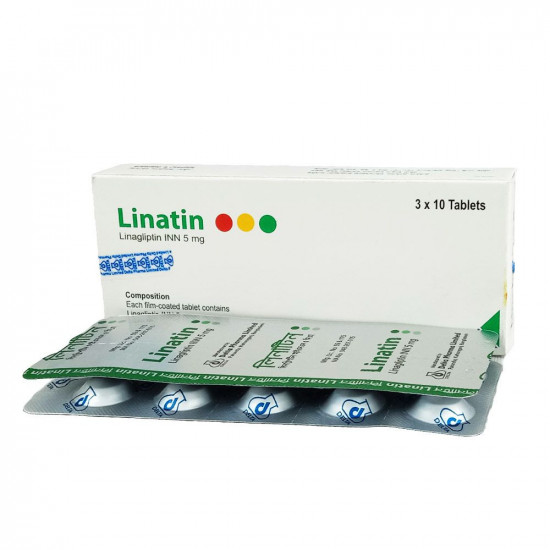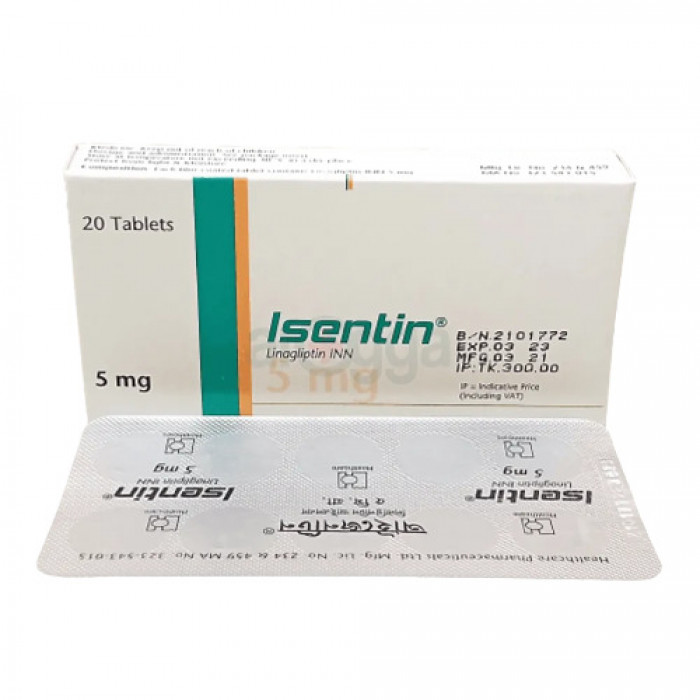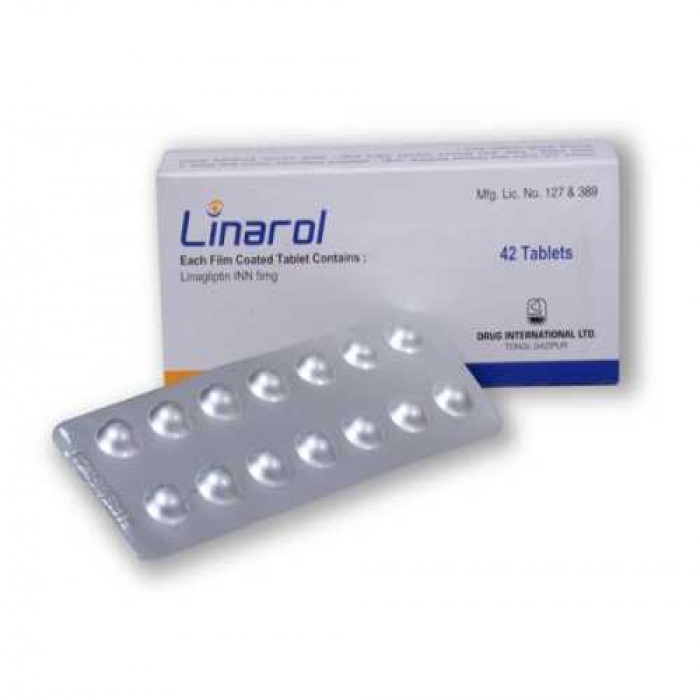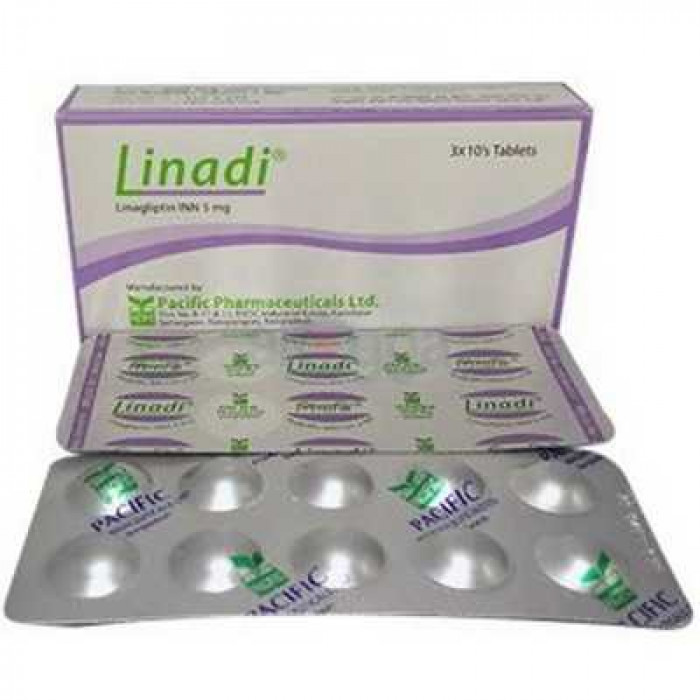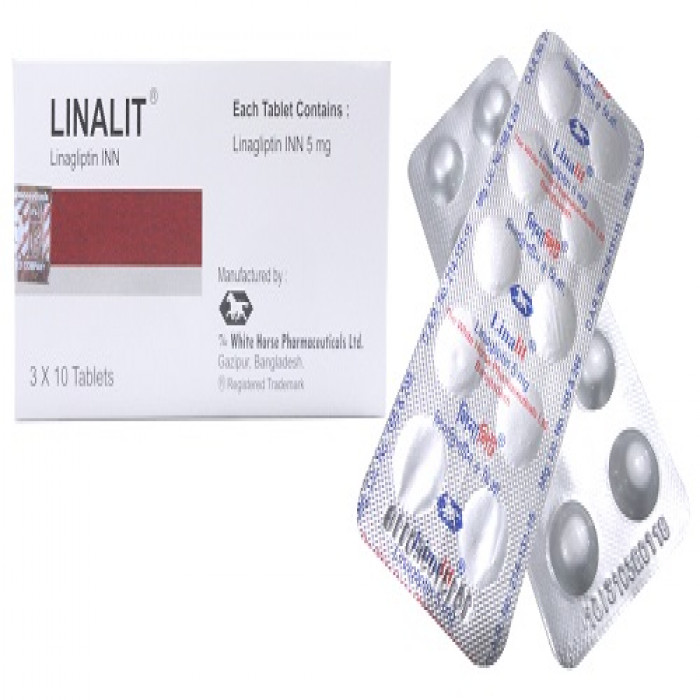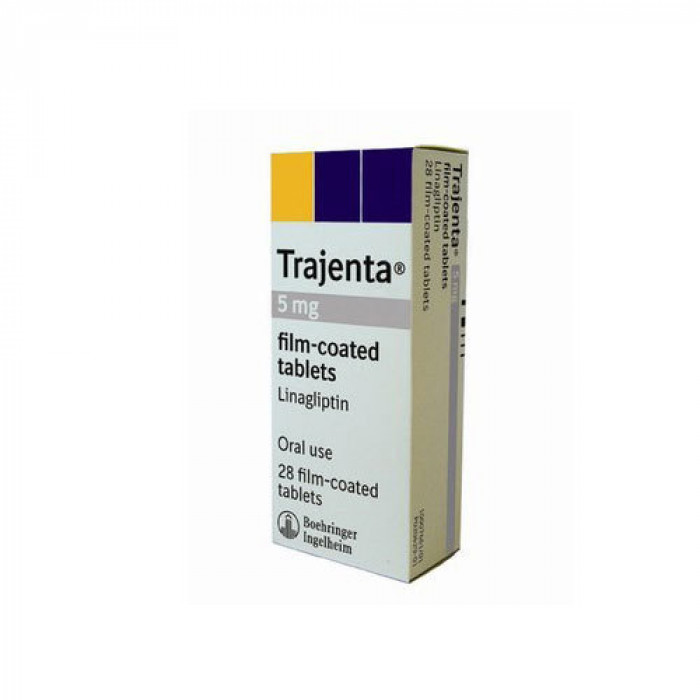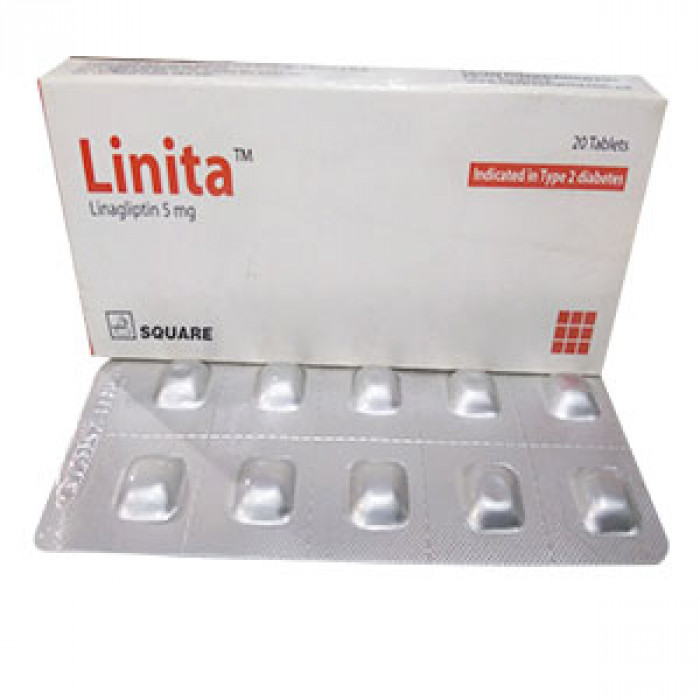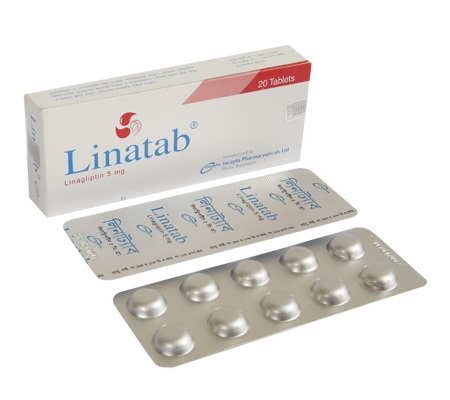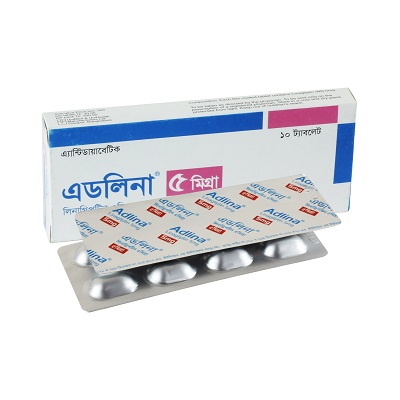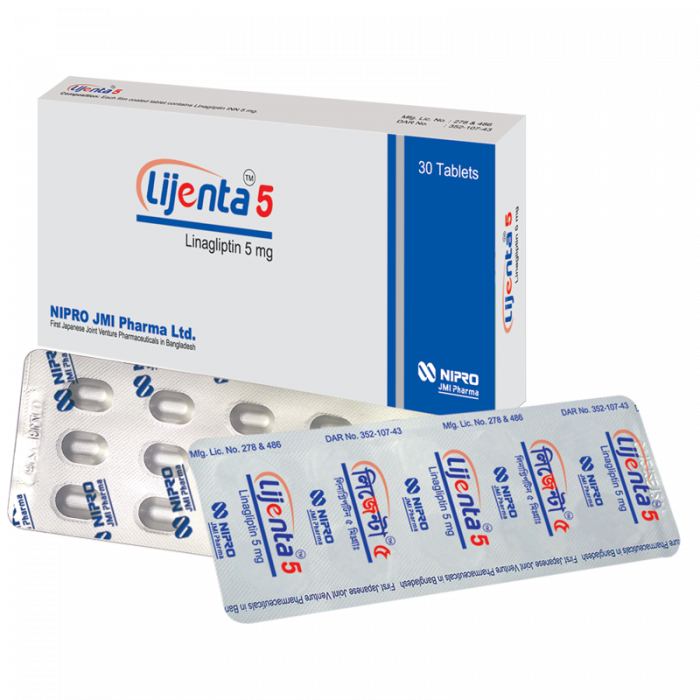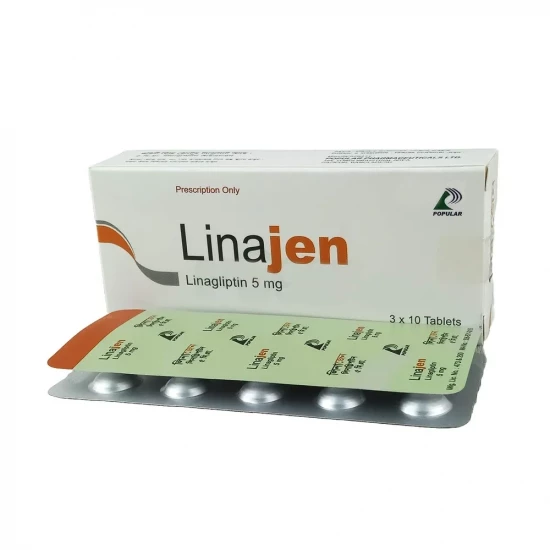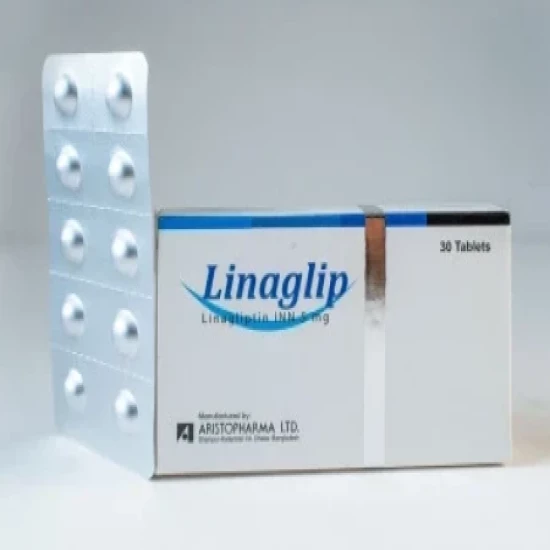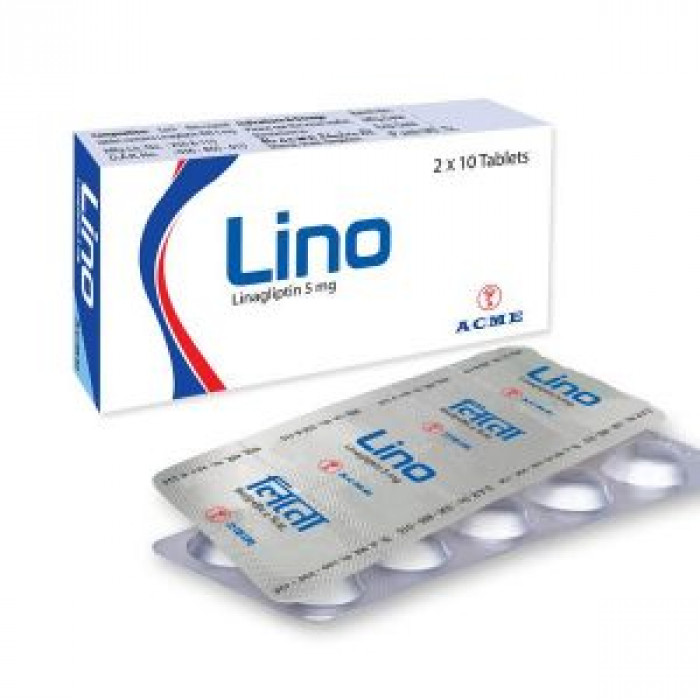
✔ 100% Authentic Product
👁️ Currently Viewing 2261
Lino 5 contains Linagliptin, which belongs to the class of dipeptidyl peptidase-4 (DPP-4) inhibitors Linagliptin is prescribed for the condition of type 2 diabetes when diet and exercise alone cannot control blood sugar levels.
Discount
Price: ৳ 207
MRP:
৳
220
6%
Off

100% Genuine Products, Guaranteed

Safe & Secure Payments, Always

Fast, Secure & Efficient Delivery

Proper Packaging
 Cash on Delivery - All over Bangladesh
Cash on Delivery - All over Bangladesh Regular Delivery - 12-24 Hours, Dhaka City* Charge Tk.39-59
Regular Delivery - 12-24 Hours, Dhaka City* Charge Tk.39-59 Regular Delivery - 24-48 Hours, Other Cities* Charge Tk.99-110
Regular Delivery - 24-48 Hours, Other Cities* Charge Tk.99-110
 ফ্রি ডেলিভারিঃ - ৯৯৯ টাকা+ অর্ডারে, ঢাকা
শহরে
ফ্রি ডেলিভারিঃ - ৯৯৯ টাকা+ অর্ডারে, ঢাকা
শহরে ফ্রি ডেলিভারিঃ - ২৯৯৯ টাকা+ অর্ডারে, ঢাকার
বাহিরে
ফ্রি ডেলিভারিঃ - ২৯৯৯ টাকা+ অর্ডারে, ঢাকার
বাহিরে
100% Genuine Products, Guaranteed
Safe & Secure Payments, Always
Fast, Secure & Efficient Delivery
Proper Packaging
 Cash on Delivery - All over Bangladesh
Cash on Delivery - All over Bangladesh Regular Delivery - 12-24 Hours, Dhaka City* Charge Tk.39-59
Regular Delivery - 12-24 Hours, Dhaka City* Charge Tk.39-59 Regular Delivery - 24-48 Hours, Other Cities* Charge Tk.99-110
Regular Delivery - 24-48 Hours, Other Cities* Charge Tk.99-110 ফ্রি ডেলিভারিঃ - ৯৯৯ টাকা+ অর্ডারে, ঢাকা
শহরে
ফ্রি ডেলিভারিঃ - ৯৯৯ টাকা+ অর্ডারে, ঢাকা
শহরে ফ্রি ডেলিভারিঃ - ২৯৯৯ টাকা+ অর্ডারে, ঢাকার
বাহিরে
ফ্রি ডেলিভারিঃ - ২৯৯৯ টাকা+ অর্ডারে, ঢাকার
বাহিরে
✅ Description:
Linagliptin is a medication primarily used to treat type 2 diabetes in adults, often in combination with other drugs and lifestyle changes. It belongs to the class of dipeptidyl peptidase-4 (DPP-4) inhibitors. This medication helps lower blood sugar levels by blocking the action of DPP-4, an enzyme that breaks down incretin hormones, which stimulate insulin release and reduce liver glucose production.
Lino 5. contains Linagliptin and is used for managing type 2 diabetes in adults when one oral anti-diabetic medicine or diet and exercise alone are insufficient. It may be used in combination with other anti-diabetic medications like metformin, sulphonylureas, empagliflozin, or insulin. Regular exercise and a proper diet are essential for better glucose control while taking this medication.
Type 2 diabetes is a chronic condition characterized by inadequate insulin production or insulin resistance, leading to elevated blood glucose levels and potential complications such as heart disease, kidney disease, and blindness. Symptoms include excessive urination, thirst, hunger, fatigue, and blurred vision.
Before taking Linagliptin, inform your doctor about any pancreas, heart, or kidney problems, type 1 diabetes, gallstones, or history of alcoholism. It's generally not recommended for pregnant or breastfeeding women, and caution is advised in patients with severe kidney or liver disease.
It's important not to stop Linagliptin abruptly without consulting your doctor, even if you feel better, as fluctuations in blood sugar levels can occur. Abrupt discontinuation may increase the risk of complications such as retinopathy, nephropathy, and neuropathy. Inform your doctor about any heart disease, pregnancy plans, or breastfeeding intentions.
Safety Advices

Alcohol
UNSAFE
It is unsafe to consume alcohol with Lino 5.

Pregnancy
CONSULT YOUR DOCTOR
Consult your doctor before using Lino 5 during pregnancy; limited human studies suggest it is generally safe, but information is lacking.

Breastfeeding
CONSULT YOUR DOCTOR
Lino 5 is likely safe to use during breastfeeding, as limited data suggest it poses minimal risk to the baby.

Driving
CAUTION
Caution is advised while driving if your blood sugar is too low or too high.

Kidney
CAUTION
Lino 5 is safe to use in patients with kidney or liver disease, but consult your doctor before use.

Liver
CONSULT YOUR DOCTOR
Lino 5 is safe to use in patients with kidney or liver disease, but consult your doctor before use.
✔️ Uses of Lino 5
Treatment of type 2 diabetes mellitus
✔️ How does Lino 5 work?
Lino 5 increases insulin release from the pancreas and decreases hormones that raise blood sugar levels, thereby reducing fasting and post-meal sugar levels.
✔️ Side Effects of Lino 5
Side effects may include hypoglycemia, nasopharyngitis, cough, and pancreatitis, particularly when used with metformin and sulfonylurea.
✔️ Quick Tips:
- Lino 5 is used to treat type 2 diabetes mellitus by controlling blood sugar levels when diet and exercise alone or other medications are insufficient.
- Take Lino 5 at the same time each day to maintain consistent blood levels.
- Be aware of signs of hypoglycemia, especially when using other diabetes medications or alcohol.
- Carry sugary foods or fruit juice to manage hypoglycemia symptoms.
- Use caution while driving or operating machinery until you know how Lino 5 affects you.
- Inform your doctor of any joint pains or abdominal symptoms.
- It should be taken regularly at the same time each day as prescribed by your doctor.
- A healthy lifestyle including diet and exercise is essential for controlling diabetes.
✔️ Indication of Lino 5
Lino is used to treat type 2 diabetes mellitus in adults to improve glycemic control. It can be used alone in patients unable to tolerate or contraindicated for metformin, or in combination with metformin or a sulphonylurea when diet and exercise alone are insufficient.
✔️ Pharmacology
Linagliptin inhibits DPP-4, an enzyme that degrades incretin hormones, thereby increasing active incretin concentrations. This stimulates insulin release and reduces glucagon secretion in a glucose-dependent manner.
✔️ Dosage & Administration of Lino 5
- Take Linagliptin 5 mg once daily, with or without food.
- No dose adjustment is needed in patients with renal impairment.
- Take as directed by your doctor, typically once daily with or without food.
- Swallow the tablet whole; do not chew, crush, or break it.
✔️ Interaction
Increased risk of hypoglycemia with insulin secretagogues; monitor linagliptin levels with P-glycoprotein inhibitors and inducers
✔️ Contraindications
- Hypersensitivity to linagliptin or any excipients.
✔️ Pregnancy & Lactation
Linagliptin is classified as pregnancy category B, but its use during pregnancy should be considered only if needed. Its excretion in breast milk is unknown.
✔️ Precautions & Warnings
Use with caution in patients with hypersensitivity to linagliptin or excipients.
✔️ Storage Conditions:
Store in a dry place away from light and heat, and keep out of the reach of children.
⚠️Disclaimer:
At ePharma, we’re committed to providing accurate and accessible health information. However, all content is intended for informational purposes only and should not replace medical advice from a qualified physician. Please consult your healthcare provider for personalized guidance. We aim to support, not substitute, the doctor-patient relationship.




